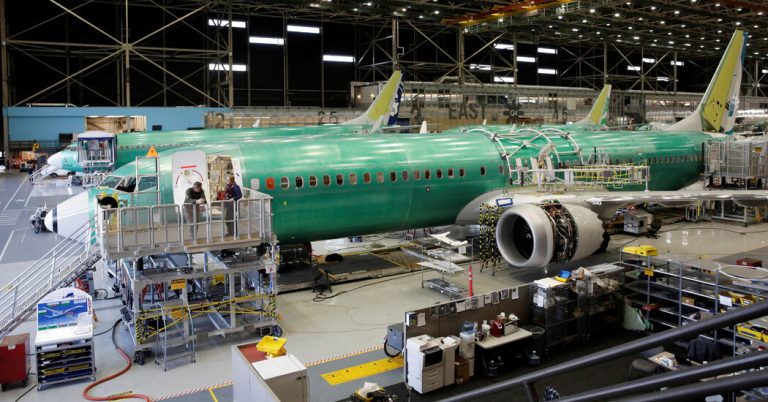Boeing’s safety culture remains flawed, despite improvements made after two fatal crashes involving the 737 Max 8 jet in 2018 and 2019, according to a Federal Aviation Administration report released Monday.
The report, written by a panel of experts convened a year ago at the behest of Congress, found there was a “disconnect” among senior executives at Boeing, which makes commercial planes as well as military aircraft and technology. The company, the commission found, was at times “inadequate and confused” in how it managed its safety culture.
In a statement, the FAA said it would “immediately begin a thorough review of the report” and take action on its recommendations, as appropriate.
“We will continue to hold Boeing to the highest safety standards and work to ensure that the company fully addresses these recommendations,” the agency said.
Boeing said in a statement that it supported the commission’s work and acknowledged that while it had taken “significant steps” to improve its safety culture, “there is more work to be done.” Since 2019, the company has made changes to emphasize safety, from its board of directors on down.
New concerns about the company’s safety culture emerged last month after a panel opened on a Boeing 737 Max 9 plane during an Alaska Airlines flight. The FAA report did not address that incident, but the National Transportation Safety Board said the panel, known as a door plug, on the Alaska plane may have left the Boeing factory without critical bolts to hold it in place.
After the incident, Boeing management encouraged employees to share their safety concerns.
“Our people at the plant know what we need to do to improve better than anyone else,” Boeing CEO David Calhoun said in a Jan. 31 message to employees. “We should all ask for their input, understand how to help and always encourage any team member who raises issues that need to be addressed. We’re going to take it slow, not rush the system and take our time to get it right.”
The FAA panel issued 53 recommendations, based on a review of thousands of pages of company documents and more than 250 interviews, each lasting at least an hour. The recommendations include urging Boeing to better communicate and define the language it uses to enhance safety and do more to assure employees that their anonymity will be protected when they report concerns or problems. The report focused primarily on policies and procedures that Boeing could improve, rather than highlighting specific failures.
Internally, Boeing has for years encouraged employees to be proactive in protecting safety and other principles the company values, urging them to “look, speak and listen.” But the panel found there had been “little or no attention to search or listening”.
The committee also looked at changes Boeing made to a program under which the FAA delegates some of its authority to company employees. That practice has drawn intense scrutiny after the fatal crashes, though experts say Congress should authorize the agency to spend far more money and hire far more people to do the job alone.
The changes Boeing made to this authorization program helped protect workers from interference or punishment, but the panel found that opportunities for retaliation remained. The panel also concluded that Boeing should do more to consider human factors in aircraft design and operation, including collecting more information from pilots.




